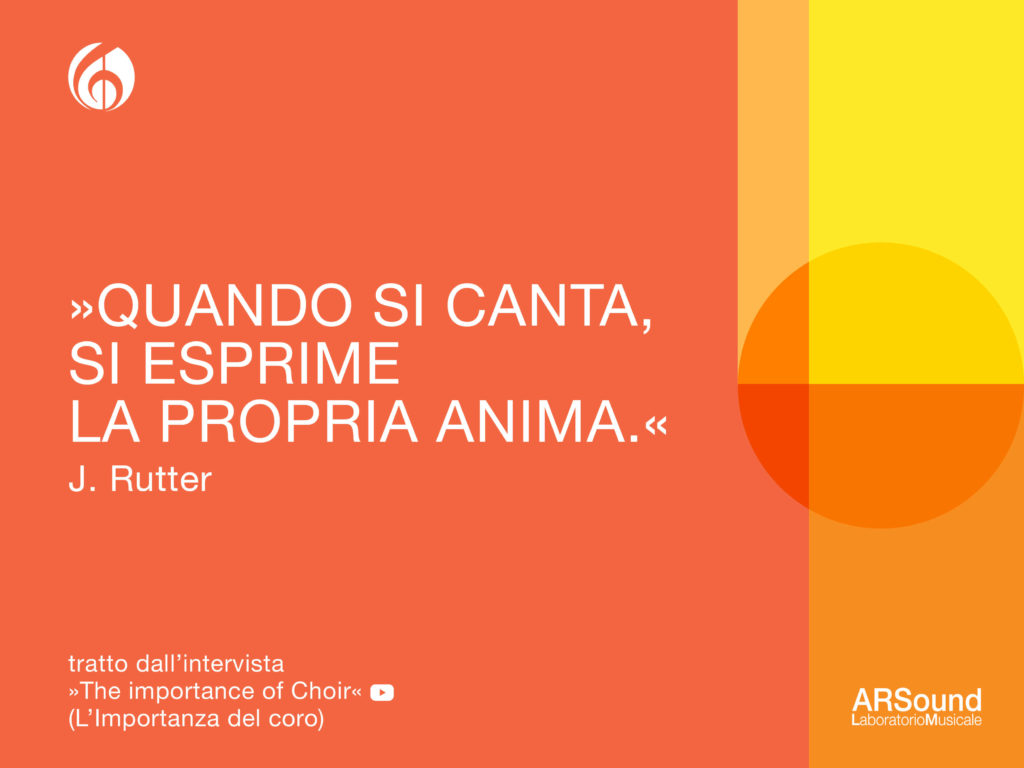Ti capita mai di leggere degli articoli che ti rimangono in testa per giorni? Libri che cambiano la tua visione delle cose?
“Le parole che SENTO” è uno spazio di condivisione di testi per noi significativi, che risuonano con il nostro essere educatori e il nostro vivere e far vivere l’arte.
The Importance Of Choir
Di John Rutter


“Choral music is not one of life’s frills, it’s something that goes to the very heart of our humanity, our sense of community, and our souls. You express, when you sing, your soul in song. And when you get together with a group of other singers, it becomes more than the sum of the part: all of those people are pouring out their hearts and souls in perfect harmony. Which is kind of an emblem for what we need in this world, when so much of the world is at odds with itself…that just to express, in symbolic terms, what it’s like when human beings are in harmony. That’s a lesson for our times and for all time. I profoundly believe that.”
“And musical excellence is, of course, at the heart of it. But, even if a choir is not the greatest in the world, the fact that they are meeting together has a social value. It has a communal value, and I always say that a church or a school without a choir is like a body without a soul. We have to have a soul in our lives. And everybody tells me, who has sung in a choir, that they feel better for doing it. That whatever the cares of the day – if they maybe meet after a long day’s school or work – that somehow you leave your troubles at the door. And when you’re sitting there, making music for a couple hours at the end of the day, that’s the only thing that matters at that moment. And you walk away refreshed. You walk away renewed. And that’s a value that goes just beyond the music itself.”
“Of course, as a musician, I put the music at the heart of it, but all of these other values just stand out as a beacon. I think our politicians need to take note…my gosh do they ever!, and our educators, those who decide education budgets, church budgets, just need to remember it’s not a frill. It’s like a great oak that rises up from the center of the human race and spreads its branches everywhere. That’s what music does for us, and choral music must stand as one of the supreme examples of it.”
Di seguito trovate la traduzione in lingua italiana della trascrizione dell’intervista.
“La musica corale non è uno dei fronzoli della vita, bensì qualcosa che arriva davvero al cuore della nostra natura umana, del nostro senso di comunità e delle nostre anime. Quando si canta, si esprime la propria anima, e quando si è insieme in un gruppo di persone che cantano, si ottiene più di una somma delle singole parti: tutte quelle persone stanno aprendo i loro cuori e le loro anime in perfetta armonia. Questo è proprio l’emblema di ciò di cui abbiamo bisogno in questo mondo, che è in gran parte in contrasto con se stesso: ciò esprime, in termini simbolici, cosa accade quando gli esseri umani sono in armonia. È un insegnamento per il nostro tempo e per ogni tempo: io ci credo profondamente.”
“L’eccellenza musicale è sicuramente al centro di questo concetto. Ma, anche se un coro non è il migliore del mondo, il fatto che le persone si riuniscano ha un valore sociale; ha un valore di condivisione. Io dico sempre che una scuola o una chiesa senza un coro sono come un corpo senza un’anima: dobbiamo avere un’anima nelle nostre vite. Chiunque abbia cantato in un coro mi dice di essersi sentito meglio dopo averlo fatto, e che, nonostante gli affanni della giornata – se magari ci si incontra dopo una lunga giornata di scuola o lavoro -, in qualche modo si lasciano le preoccupazioni da parte, e, quando si è seduti lì, fare musica per un paio d’ore alla fine della giornata è l’unica cosa che conta in quel momento. Si esce così rigenerati, rinnovati. E questo è un valore che va al di là della musica in sé.”
“Certamente, come musicista, pongo al centro la musica, ma tutti questi altri pregi emergono come punto di riferimento. Penso che i nostri politici debbano pensare a ciò – mio dio, chissà se lo faranno mai – , e i nostri educatori, e coloro che stabiliscono i bilanci per l’educazione, i bilanci della Chiesa, dovrebbero semplicemente ricordarsi che non si tratta di un fronzolo. È come una grande quercia che si innalza dal centro dell’umanità e allarga i suoi rami ovunque. Questo è quello che la musica fa per noi, e proprio la musica corale deve rappresentare uno dei maggiori esempi di ciò.”